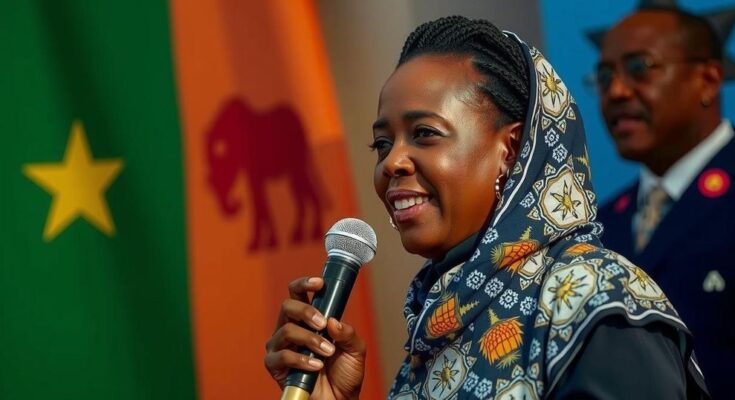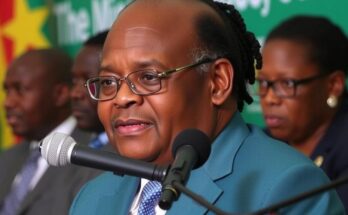Namibia could elect its first female president, Netumbo Nandi-Ndaitwah, who leads with 54.82 percent of votes counted in disputed elections. However, a failure to exceed 50 percent may result in a run-off. The election has faced logistical issues, prompting opposition claims of irregularities and a vow to contest the results in court.
Namibia is on the cusp of electing its first female president, Netumbo Nandi-Ndaitwah, who presently maintains a leading position following the counting of ballots from the recent disputed elections. As of now, with 65.57 percent of the ballots processed, Nandi-Ndaitwah, aged 72, representing the governing South West Africa People’s Organisation (SWAPO), has garnered 54.82 percent of the votes. However, should she fail to exceed the required 50 percent threshold, a run-off election may be necessary.
The election results, which were expected shortly after the November 27 polling, were delayed due to various technical hitches, including issues with ballot paper availability. The main opposition party, Independent Patriots for Change (IPC), has decried the election process as a sham, asserting that their candidate, Panduleni Itula, is trailing with 28 percent of the votes counted thus far. Currently, results from 79 out of 121 constituencies have been tabulated, with a reported voter turnout of 73 percent from nearly 1.5 million registered voters.
Nandi-Ndaitwah, who also serves as the vice president, is navigating a potentially tumultuous political landscape, as the SWAPO party originated from the struggle for independence from apartheid South Africa in 1990. Discontent among younger voters persists due to high unemployment and social inequalities, leading to criticisms of the ruling party’s governance. Furthermore, allegations of voting irregularities have arose, and opposition leaders have vowed to challenge the election’s legitimacy in court should the final results be unfavorable.
Opposition leader Itula expressed his concerns about election conduct, stating, “The rule of law has been grossly violated and we cannot call these elections by any means or measure as free, fair and legitimate,” highlighting the contentious atmosphere surrounding the election process. The election outcomes and their implications for Namibia’s democratic framework continue to be a focal topic of concern as the country anticipates their final announcement.
The political climate in Namibia is presently charged as it approaches a critical juncture in its electoral history. With the potential election of Netumbo Nandi-Ndaitwah, the country may witness its first female head of state. This transitional period is complicated by observed difficulties and irregularities during the electoral process, prompting significant opposition dissent. Namibia has historically been regarded as a stable democracy in the Southern African region, yet current challenges, particularly related to voter disenfranchisement and extended voting timelines, have raised alarms about the electoral integrity and future governance. The SWAPO party, having led Namibia since its independence, faces escalating public discontent due to socioeconomic issues affecting the youth, which further complicates the electoral landscape. The response from opposition entities indicates a preparedness to legally contest the election results, viewing them as critical not just for their parties but also as a reflection of the nation’s democratic integrity.
In summation, Namibia is standing at a pivotal moment with the possibility of electing its first female president amidst a backdrop of electoral disputes and public dissatisfaction with the ruling party’s performance. The integrity of the electoral process has been called into question, with significant opposition voices preparing to challenge the results if necessary. As the nation awaits the final vote tally, it faces an imperative to navigate through these challenges to uphold democratic values and allow for equitable representation for all citizens.
Original Source: www.aljazeera.com




